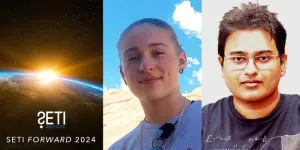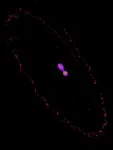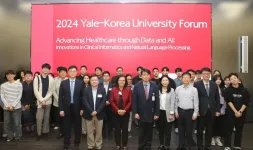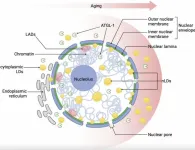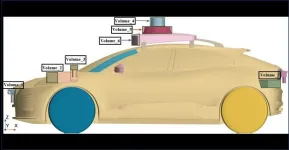(Press-News.org) January 7, 2025, Mountain View, CA -- The SETI Institute announces the 2024 SETI Forward Award recipients: Gabriella Rizzo and Pritvik Sinhadc. This year's recipients worked on research projects to understand extremophiles in deep-sea hydrothermal vents and to analyze gravitational wave signals for potential extraterrestrial technosignatures. Established by Lew Levy, SETI Forward committee founder and member of the SETI Institute’s Council of Advisors, this award is a beacon for promising young scientists. The goal is to connect students with opportunities that foster their passion for SETI and astrobiology, guiding them toward meaningful careers.
“In our 6th year of SETI Forward, I am continually impressed with the amazing students entering the scientific community,” said Levy. “SETI Forward recognizes undergraduates such as Gabriella and Pritvik who want to join the search for life outside of Earth, and I have no doubt they will join the growing SETI community.”
Gabriella Rizzo: Life at the Limits
Gabriella, currently a first-year PhD student in the Genetics, Cellular and Molecular Biology program at the University of Nebraska-Lincoln in Dr. Karrie Weber's lab, conducted her research at the University of Massachusetts Amherst under the direction of Dr. James Holden as an undergraduate.
Gabriella’s research explored how life can survive in extreme environments like deep-sea hydrothermal vents. The study discovered a new microbe called strain Ax23, a heat-loving organism that produces methane. Found in a Pacific Ocean vent, it thrives at 149°F (65°C), using hydrogen and carbon dioxide for energy. This microbe's survival in such harsh conditions suggests that similar life forms might exist in hydrothermal environments on other worlds, like Europa or Enceladus.
“Astrobiology is inherently an interdisciplinary science—a synthesis of geomicrobiology, physics, chemistry, and astronomy,” said Gabriella. “This breadth allows me the unique and rare opportunity to approach my research questions from many perspectives. Through astrobiology, I have honed my ability to bridge disciplines, distill complex ideas, and collaborate seamlessly across varied scientific backgrounds. These skills position me to lead future projects that address fundamental questions about the nature and existence of life in the universe.”
Pritvik Sinhadc: Decoding the Cosmos
Pritvik is currently pursuing a Bachelor of Science degree with a Major in Physics and a Minor in Astrophysics at the California Institute of Technology (Caltech) and conducted his research at Caltech under the mentorship of Dr. Yuk L. Yung and Dr. Stuart Bartlett.
Pritvik’s project introduced a new way to search for signs of alien technology by studying gravitational waves (GWs), ripples in space caused by massive cosmic events. Using Complexity Theory, a tool for measuring patterns and unpredictability, his research looks for unusual signals in GWs that might point to advanced alien civilizations. This approach differs from traditional methods that focus on detecting radio signals or signs of life as we know it. Instead, it uses universal patterns that could work for any intelligent life, no matter how different it is from us. If successful, this research could change how we search for life in the universe and help answer the question: Are we alone?
“This project has been an extraordinary journey, allowing me to merge my passions for astrophysics, GW physics, and astrobiology,” said Pritvik. “Exploring the unknown and pushing the boundaries of science drive me, and I am honored to receive the SETI Forward Award. This recognition is not just an acknowledgment of my work but a catalyst for my aspirations to redefine how we search for extraterrestrial intelligence by integrating GW physics with Complexity Theory, offering a universal and inclusive approach to identifying technosignatures. I hope to contribute to a future where humanity understands its place in the cosmos and explores life as we don't know it. As I advance in my academic and professional journey, I aspire to bridge theoretical physics, astrophysics, and astrobiology, strengthening my resolve to continue asking big questions about life in the universe."
The SETI Forward award, conceived through Lew Levy's collaboration with SETI Institute trustee Dane Glasgow, aims to bridge the gap between undergraduate internships, graduate school, and careers. By providing stipends for research collaborations or conference participation, SETI Forward empowers young scientists to continue their exploration of cosmic mysteries.
The diverse panel overseeing the SETI Forward Fund administration selected this year's recipients. Undergraduates at accepted institutions participating in mentored internships are eligible to apply.
Gabriella Rizzo and Pritvik Sinhadc will be officially honored at the next Drake Awards event in May 2025.
About the SETI Institute
Founded in 1984, the SETI Institute is a non-profit, multi-disciplinary research and education organization whose mission is to lead humanity's quest to understand the origins and prevalence of life and intelligence in the universe and to share that knowledge with the world. Our research encompasses the physical and biological sciences and leverages expertise in data analytics, machine learning and advanced signal detection technologies. The SETI Institute is a distinguished research partner for industry, academia and government agencies, including NASA and NSF.
Contact information
Rebecca McDonald
Director of Communications
SETI Institute
rmcdonald@seti.org
END
SETI Forward recognizes tomorrow’s cosmic pioneers
SETI Forward connects students with opportunities that foster their passion for SETI and astrobiology, guiding them toward meaningful careers
2025-01-07
ELSE PRESS RELEASES FROM THIS DATE:
Top mental health research achievements of 2024 from the Brain & Behavior Research Foundation
2025-01-07
The Brain & Behavior Research Foundation (BBRF) has announced the 2024 Leading Research Achievements by BBRF grantees, prizewinners, and scientific council members. It includes important studies of suicide, childhood anxiety, depression, eating disorders, cocaine addiction, and other aspects of brain and behavior illness.
The 2024 Leading Research Achievements are:
Suicide Risk Fluctuates Across the Menstrual Cycle, Affecting Different Women Differently
Tory Anne Eisenlohr-Moul, Ph.D., University of Illinois, Chicago
Preliminary Trial of Psychoactive ...
FAU names Lewis S. Nelson, M.D., Dean of the Schmidt College of Medicine
2025-01-07
Florida Atlantic University has named Lewis S. Nelson, M.D., as the new dean of the Charles E. Schmidt College of Medicine. Nelson previously served as professor and inaugural chair of the Department of Emergency Medicine and chief of the Division of Medical Toxicology and Addiction Medicine at Rutgers New Jersey Medical School in Newark, and chief of the Emergency Department at University Hospital of Newark, a public safety net hospital. He assumed his role as dean on Jan. 6.
Nelson has more than 30 years of academic and clinical leadership experience with a proven record of fostering innovation, research, and clinical excellence. During his eight-year tenure ...
UC Irvine-led study challenges traditional risk factors for brain health in the oldest-old
2025-01-07
Irvine, Calif., Jan. 7, 2025 – A study led by the University of California, Irvine has found cardiovascular conditions such as high blood pressure and diabetes, which are known to contribute to brain blood vessel damage in younger populations, not to be associated with an increased risk of such harm in individuals 90 and older.
The work, published online today in the journal Alzheimer’s & Dementia: The Journal of the Alzheimer’s Association, suggests that the relationship among blood pressure, vascular health and brain aging is more complex than previously thought.
“For decades, we’ve known that factors like high blood ...
Study shows head trauma may activate latent viruses, leading to neurodegeneration
2025-01-07
Concussions and repetitive head trauma in sports like football and boxing, once accepted as an unpleasant consequence of intense athletic competition, are now recognized as serious health threats. Of particular concern is the connection between head injuries and neurodegenerative diseases such as chronic traumatic encephalopathy, Alzheimer’s disease, and Parkinson’s disease, prompting sports governing bodies to adjust protective equipment and rules of play to minimize the risk.
Researchers at Tufts University and Oxford University have now uncovered mechanisms that may ...
Advancements in neural implant research enhance durability
2025-01-07
Crucial research on brain diseases
Neural implants are crucial in order to study the brain and develop treatments for patients with diseases like Parkinson's or clinical depression. Neural implants electrically stimulate, block, or record signals from neurons or neural networks in the brain. For study and treatment, and specifically for chronic use, these neural implants must be durable.
"Miniaturized neural implants have enormous potential to transform healthcare, but their long-term stability in the body ...
SwRI models Pluto-Charon formation scenario that mimics Earth-Moon system
2025-01-07
SAN ANTONIO — January 7, 2025 —A NASA postdoctoral researcher at Southwest Research Institute has used advanced models that indicate that the formation of Pluto and Charon may parallel that of the Earth-Moon system. Both systems include a moon that is a large fraction of the size of the main body, unlike other moons in the solar system. The scenario also could support Pluto’s active geology and possible subsurface ocean, despite its location at the frozen edge of the solar system.
“We ...
Researchers identify public policies that work to prevent suicide
2025-01-07
An analysis led by New York University researchers determines which public policies effectively prevent suicide deaths in the United States. But it’s not just policies that limit firearms and expand access to health care—many economic and social policies that are not explicitly focused on mental health can also prevent suicide, according to their article published in the Annual Review of Public Health.
“Most of the policies that demonstrate evidence do not mention suicide and were not passed to prevent ...
Korea University College of Medicine and Yale Univeristy co-host forum on Advancing Healthcare through Data and AI Innovations
2025-01-07
Korea University College of Medicine and Yale Univeristy Co-Host Forum
on Advancing Healthcare through Data and AI Innovations
On October 2nd (Wednesday), Korea University College of Medicine (Dean: Pyun Sung-Bom) hosted a forum titled “Advancing Healthcare through Innovations in Data and AI in Clinical Informatics and Natural Language Processing” in the 6th-floor lecture hall of the First Medical Building.
As part of Korea University’s 120th-anniversary celebration, this annual joint forum with Yale University has been held since 2023. This year’s ...
Nuclear lipid droplets: Key regulators of aging and nuclear homeostasis
2025-01-07
“A consistent feature of aging across diverse species is the progressive accumulation of lipid droplets (nLDs) within the nuclear compartment, which disrupts nuclear architecture and functionality.”
BUFFALO, NY- January 7, 2025 – A new research perspective was published in Aging (listed by MEDLINE/PubMed as “Aging (Albany NY)” and “Aging-US” by Web of Science) Volume 16, Issue 22 on December 9, 2024, entitled “Nuclear lipid droplets: a novel regulator of nuclear homeostasis ...
Driving autonomous vehicles to a more efficient future
2025-01-07
WASHINGTON, Jan. 7, 2025 – Thanks to the rapid progress of information technology and artificial intelligence, autonomous vehicles (AVs) have been taking off. In fact, AV technology is now advanced enough that the vehicles are being used for logistics delivery and low-speed public transportation.
While most research has focused on control algorithms to heighten safety, less attention has been directed at improving aerodynamic performance, which is essential for lowering energy consumption and extending driving range. As a result, aerodynamic drag issues have ...
LAST 30 PRESS RELEASES:
Cancer and inflammation: immunologic interplay, translational advances, and clinical strategies
Bioactive polyphenolic compounds and in vitro anti-degenerative property-based pharmacological propensities of some promising germplasms of Amaranthus hypochondriacus L.
AI-powered companionship: PolyU interfaculty scholar harnesses music and empathetic speech in robots to combat loneliness
Antarctica sits above Earth’s strongest “gravity hole.” Now we know how it got that way
Haircare products made with botanicals protects strands, adds shine
Enhanced pulmonary nodule detection and classification using artificial intelligence on LIDC-IDRI data
Using NBA, study finds that pay differences among top performers can erode cooperation
Korea University, Stanford University, and IESGA launch Water Sustainability Index to combat ESG greenwashing
Molecular glue discovery: large scale instead of lucky strike
Insulin resistance predictor highlights cancer connection
Explaining next-generation solar cells
Slippery ions create a smoother path to blue energy
Magnetic resonance imaging opens the door to better treatments for underdiagnosed atypical Parkinsonisms
National poll finds gaps in community preparedness for teen cardiac emergencies
One strategy to block both drug-resistant bacteria and influenza: new broad-spectrum infection prevention approach validated
Survey: 3 in 4 skip physical therapy homework, stunting progress
College students who spend hours on social media are more likely to be lonely – national US study
Evidence behind intermittent fasting for weight loss fails to match hype
How AI tools like DeepSeek are transforming emotional and mental health care of Chinese youth
Study finds link between sugary drinks and anxiety in young people
Scientists show how to predict world’s deadly scorpion hotspots
ASU researchers to lead AAAS panel on water insecurity in the United States
ASU professor Anne Stone to present at AAAS Conference in Phoenix on ancient origins of modern disease
Proposals for exploring viruses and skin as the next experimental quantum frontiers share US$30,000 science award
ASU researchers showcase scalable tech solutions for older adults living alone with cognitive decline at AAAS 2026
Scientists identify smooth regional trends in fruit fly survival strategies
Antipathy toward snakes? Your parents likely talked you into that at an early age
Sylvester Cancer Tip Sheet for Feb. 2026
Online exposure to medical misinformation concentrated among older adults
Telehealth improves access to genetic services for adult survivors of childhood cancers
[Press-News.org] SETI Forward recognizes tomorrow’s cosmic pioneersSETI Forward connects students with opportunities that foster their passion for SETI and astrobiology, guiding them toward meaningful careers
